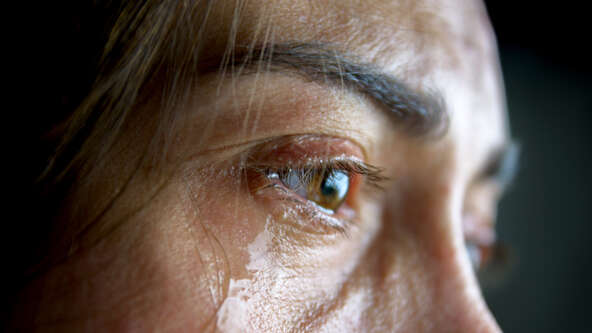Can Dehydration Make Grief Feel Worse?

Grief-related depression is common after losing a loved one. So is crying. If you aren't taking care of yourself, you could cry to the point of dehydration. At that point, you won't be able to cry any further until you replenish your body's water supply.
Crying alone isn’t likely enough to bring your body to the point of dehydration. However, grieving people often fail to properly care for themselves — including drinking enough plain water throughout the day. Excessive crying and a low water intake make it challenging to stay hydrated.
How Water Affects Our Health
Water is essential for the proper functioning of every system and organ in your body, including your brain, composed of about 75 percent water. Medical experts say that becoming dehydrated can worsen depression and anxiety, two common side effects of grief. Dehydration and depression are interconnected in several ways, with chronic dehydration being a potential symptom of depression.
A research study at the University of Connecticut found that even a 1.5 percent decrease in your body’s water volume can substantially impact mood, energy levels, and cognitive abilities.
Grief makes self-care overwhelming, but drinking more water is a simple way to help you feel better. Here are a few benefits of staying hydrated.
Adequate Hydration Increases ‘Feel-Good’ Levels
Serotonin is a crucial neurotransmitter that affects mood, and low serotonin levels are often associated with depression. When our body turns an amino acid called tryptophan into serotonin, it needs enough water to move across the blood-brain barrier. So, if we don’t have enough water in our body, tryptophan can’t reach the brain properly, affecting serotonin levels.
Drinking more water increases serotonin production, which can increase good feelings. Drinking plain water is associated with a decreased risk of depression and anxiety in adults, according to a study published in the World Journal of Psychiatry.
Drinking Water Boosts Brain Energy
Water plays a crucial role in generating the electrical energy required for brain function, and dehydration hampers this process. Not drinking enough water can reduce brain energy and contribute to depression.
According to F. Batmanghelidj, M.D., in Your Body’s Many Cries for Water: “With dehydration, the level of energy generation in the brain is decreased. Many functions of the brain that depend on this type of energy become inefficient. We recognize this inadequacy of function and call it depression.”
Get more grief support from Tulip
Staying Hydrated Reduces Stress in Your Body
Stress is a significant contributor to depression, and dehydration can both cause and exacerbate stress. Dehydration leads to increased cortisol production, the adrenal glands' stress hormone. Chronic stress can exhaust the adrenal glands, reducing aldosterone production, a hormone that regulates fluid and electrolyte levels. This drop in aldosterone triggers dehydration and electrolyte imbalances, further contributing to stress. Drinking sufficient water can help alleviate the physiological and psychological effects of stress.
How Much Water Should You Drink a Day?
While drinking water might not hasten your grief journey or cure all signs of depression, it may be a crucial factor for chronically dehydrated individuals. The Mayo Clinic recommends drinking approximately half your body weight in ounces daily as a general guideline for adequate hydration.
However, specific water requirements vary based on weight, gender, stress level, climate, exercise intensity, and health conditions, including pregnancy and breastfeeding. Ask your healthcare provider how much water you should drink each day.
Know the Warning Signs of Dehydration
Older adults and those with underlying health conditions are more at risk for serious or fatal complications from inadequate hydration. Here are symptoms of dehydration from the Mayo Clinic:
- Less frequent urination
- Dark-colored urine
- Extreme thirst
- Fatigue
- Dizziness
- Confusion
Even if you're not feeling thirsty, drinking plenty of fresh water throughout the day can prevent these symptoms.
Taking Care of Yourself
Losing a loved one is never easy, but Tulip’s 24/7 care team is here to help. We offer simple, affordable direct cremation plans you can arrange online or over the phone. You can also make preplan arrangements for someone who is seriously ill so that everything is in place when the time comes. Most families complete their arrangements in about 15 minutes or less from the comfort of their homes. Call our Tulip care team 24/7 at (844) 942-4909 to learn more.